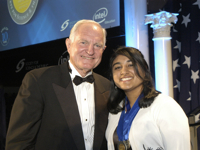
| TH E N I H C A T A L Y S T | JU L Y – A U G U S T 2008 |
| | |
Each year, the Intel Science Talent Search drives thousands of high school students from across the country to develop innovative research projects at cutting-edge laboratories in a quest to achieve the oldest and most prestigious award for young scientists in America.
This year's winner of the "baby Nobel" is Shivani Sud, an aspiring geneticist from Durham, N.C., whose lifelong interest in cancer research has led her to spend every summer since eighth grade at the bench: at Temple University in 2004 and 2005; at an NCI lab in 2006; and at Duke University in 2007.
 |
Shivani Sud with Intel Chair Craig Barrett |
Sud won the top prize for a screening procedure that could change the way early-stage colon cancer is diagnosed and treated. Colon cancer, the second leading cause of cancer-related death, has a tendency to recur after surgery, and varying chemotherapies for the recurring cancer can have different success rates. Sud analyzed a publicly available data set that included RNA fingerprints of colon cancer samples and recurrence rates after surgery and chemotherapy, and came up with a 50-gene predictor for patient response to an array of chemical agents.
Testing this predictor on cell lines, she was able to ascertain that the assay could improve success rates of treatment and spare patients the burden of chemotherapy in cases where it wouldn't be useful.
At NIH, Sud worked with Maria Tsokos, a senior investigator in NCI's Laboratory of Pathology, whom she credits for helping her to focus her interests on gene signatures. This, she said, led to her award-winning research at Duke under the guidance of Anil Potti, an assistant professor in the Department of Medicine and Institute for Genome Sciences and Policy.
Sud and her Duke lab hope to soon publish her research and move it into phase-one clinical trials. Sud herself wishes to expand her work: Concerned that her method relies on microarray technology, which is hard to perform without advanced equipment, she wants to develop a similar assay that relies on simpler PCR technology.
The Intel Science Talent Search, sponsored by Westinghouse from its creation in 1942 until 1998, singles out amazing young people who show incredible promise for scientific research. Shivani Sud is no exception. She attended a public high school whose science program, she said, "could use a little help." So on her own, she sought opportunities in cancer research labs.
Driven by her fascination with the enigma of cancer and her personal experience of a family member's struggle with cancer in her childhood, Sud would spend late nights at the lab trying to perfect her screening method. She didn't think to submit her research to Intel, she said, until a lab mate suggested giving it a shot.
For her first-place prize, Sud has a received a $100,000 scholarship. She will attend Princeton this fall and intends to pursue a career in biological research. She aims to earn a PhD/MD because it would offer her more opportunities for clinical research.
A list of the ten Intel science winners is at http://www.societyforscience.org/sts/67sts/winners.asp.